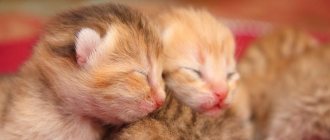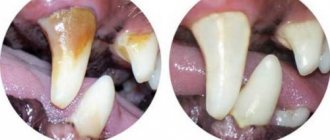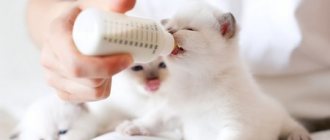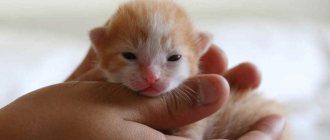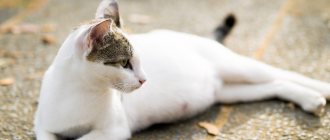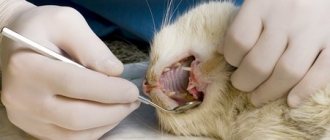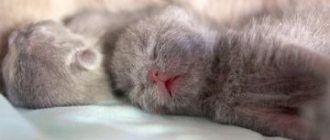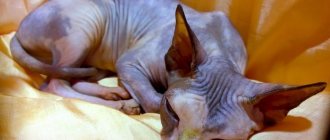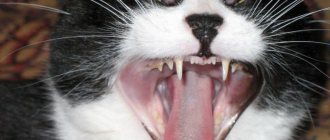Milk teeth and their replacement
Kittens are born toothless. In the second week of life, their baby teeth should grow in. The process is completed by 3-4 months. The normal physiological process of replacing baby teeth with permanent teeth begins immediately. By the age of seven months, this process is completed.
Sick cat
During this period, the pet’s oral cavity and gum condition are monitored. An animal is considered adult when it has 30 teeth:
- incisors - fix prey, 12 pieces (equally on the upper and lower jaws);
- fangs - animals use them to kill prey, 4 pieces (one each to the left and right of the incisors on both jaws);
- premolars - small molars, 10 pieces (4 at the top, 6 at the bottom);
- molars - grind food, 4 pieces (equally on each jaw).
Causes of loss of permanent teeth
The cat is drooling: the main causes and treatment options
Proper nutrition and good care guarantee the preservation of the animal's teeth until old age. But, if after a year of life a cat’s teeth fall out, this is evidence of pathology:
Gum inflammation
- Trauma to the soft tissues of the oral cavity - causes inflammation, but is easily treated.
- Stomatitis - the causes have not been studied. Inflammation progresses on the gums, making it painful for the cat to chew and swallow. The mouth may smell and saliva may flow. The animal loses appetite and weight. When the disease is advanced, it turns out that the cat has lost all its front teeth.
- Malocclusion—the lower jaws are not aligned correctly with the upper jaws. In clinics, pathological occlusion is corrected; it leads to tooth loss and disease. The aesthetic side is not taken into account.
- Lack of vitamins and minerals. Poor nutrition leads to vitamin deficiency, weak gums, and tooth loss.
- Tartar. The reason why a cat accidentally lost a tooth may lie in soft food from the owner’s table. Such food settles on the teeth, gradually becomes cemented, and tartar forms.
Oncological diseases, intestinal infections, antibiotics and hormonal drugs, old age. These are the reasons that explain why a cat's permanent teeth fall out.
Information: Tartar often forms in old, weakened and sick individuals.
Treatment: what the doctor prescribes
Therapy is selected individually, taking into account the reasons that led to such changes. The main goal of its implementation is to eliminate the provoking factor and normalize the animal’s condition.
Nutrition correction
The first thing to do is to adjust the animal’s diet.
It is extremely important that the menu is balanced . It should contain a sufficient amount of vitamins and microelements.
Tartar removal
If necessary, remove hard plaque under anesthesia. The pet is conscious, but cannot offer resistance.
Upon completion of the process, the cat needs to be provided with complete care. The procedure is very stressful for him.
Treatment of the underlying disease
The main emphasis is on eliminating the pathology that provoked tooth loss. For this purpose, immunostimulating, anti-inflammatory drugs and antibiotics can be prescribed. The therapy is aimed at strengthening the gums, eliminating bleeding and pain.
Symptoms accompanying tooth loss
Cat harness: main types and DIY options
When the problem is detected at an early stage, treatment is successful. Owners monitor the behavior of their pets in order to notice the symptoms of dental disease in cats in time and begin treatment.
At the veterinarian's appointment
Signs of the disease:
- It hurts the cat to chew. She refuses to eat or chews carefully so as not to touch the sore spot.
- Becomes aggressive and irritable. Bites and scratches its owner. Meows anxiously.
- He rubs his face with his paw, washes himself, shakes his head - perhaps the cat’s fang has fallen out.
- Sits with his mouth open.
The owner must examine the gums and tongue. If there are abscesses and bumps on the jaws, there is an unpleasant odor from the mouth - these are symptoms of diseased incisors.
Saliva flows profusely, the gums are swollen and red. Blood and pus from the mouth are a reason to seek medical help.
When an old cat’s teeth are loose, they don’t think twice about what to do - go to the veterinarian. The clinic relieves suffering for older animals.
Important! Dental problems begin gradually. An attentive owner notices the symptoms in time. Treatment in the initial stages of the disease keeps the cat healthy.
Why did the cat's fang fall out?
Veterinarians consider the main factors for tooth loss to be:
- replacement of baby teeth in kittens;
- animal disease;
- age-related loss;
- mechanical loss of a tooth (for example, due to an unsuccessful fall from a height).
For a pet, losing its fangs is not as scary as for its wild relative. Cats need their fangs for hunting; they do not take part in chewing food. What to do if a cat’s fang falls out after an injury? Experienced owners advise taking a closer look at their pet’s behavior. In cases where the animal does not show signs of anxiety and remains active and playful, there is no cause for concern. However, if your pet's usual behavior changes, you should contact a veterinarian.
Ways to solve dental problems
How to brush a cat's teeth: options at home
Pets can have caries and gingivitis, as well as osteomyelitis and periodontitis. At first they all look like caries: the enamel is destroyed. Therefore, only a good veterinarian can accurately diagnose the problem.
Regular caries goes through several stages before a cat's gums become inflamed. Pain appears precisely from this, already in the later stages.
A sign of caries is a white spot on a canine or premolar. At this point, the owner can still help the cat. The stain is treated with hydrogen peroxide, and the mouth is washed with herbal infusions.
When they can’t help, they go to the vet. The dentist has special cauterizing agents in his arsenal. If they do not help, or the disease is advanced, the diseased element is removed. The operation is performed under full anesthesia, and the wound is sutured.
For several days after this, the animal is given painkillers.
Problems are solved using other, less drastic, methods:
- Organize proper nutrition. You need to feed your cat moderately soft food, but with layered solid inclusions. This provides the necessary load on the gums.
- They use drugs to strengthen teeth: antibiotics, antiseptics. When infections are eliminated, inflammation does not occur in the oral cavity, which leads to dental diseases.
- Strengthen the gums with ointments Metrogyl Denta, Dentavidin. The drug Zubastik helps a lot.
- They give vitamins and immune support products. Which ones are determined by the veterinarian after examining the animal. A weak immune system and lack of vitamins and minerals in the diet lead to weakened gums. They bleed and become breeding grounds for bacteria and germs.
- Strengthen teeth with nutrition: Denta-Kiss Gimpet (2-4 tablets daily), Beafar crispy pads (5-6 pieces per day), Happy cat cookies.
How to help an animal?
With proper care and a balanced diet, cats' teeth serve them well into old age. Experts will help you find out why an adult cat’s fang fell out. The fact that a healthy animal loses a tooth often signals a health problem. It could be:
- Decreased immunity level.
- Lack of vitamins.
- Damage and microtrauma of the oral cavity.
- Formation of tartar.
- Changes in metabolic processes.
- Taking antibiotics.
- Infectious diseases.
- Stomach diseases.
Careful observation of your pet will help the doctor make the correct diagnosis. Depending on the reasons, the specialist will give recommendations on the choice of food, medications and products that strengthen the cat’s gums and teeth. If necessary, the cat will undergo surgery to remove tartar at the veterinary clinic.
Watch a video about changing teeth in kittens.
Cats cope with many diseases without human help. When a cat's fang falls out and his gums are swollen, the pet needs help. Before contacting the veterinarian, we should treat the gums with special ointments. At the same time, it is not at all necessary to look for medications in veterinary pharmacies. Similar remedies for treating inflammation of the human oral cavity are perfect for a caudate family member. You need to carefully treat the problem area with the chosen drug and make an appointment with a doctor as soon as possible.
But if a cat’s fang falls out, but the root remains, you cannot do without specialists. Only urgent removal can relieve the animal from pain. Otherwise, the gums will become inflamed at the root. If the owner has the desire and opportunity, doctors offer to put a crown on a broken tooth. However, this procedure has many disadvantages. For example, grinding down a tooth can cause gum inflammation. The implant will cause discomfort to the cat, or simply will not take root. A pet is quite capable of living without fangs until old age.
The kitten's fang fell out: what to do?
If a kitten's fang falls out, this is normal. Kittens, just like regular children, lose their baby teeth as they grow up. A kitten's behavior changes during the period of teeth change. Small cats and cats begin to chew everything that comes into their field of vision. This happens because their gums itch very much where their permanent teeth erupt.
At such times, the owner must be sure to keep track of what exactly the kitten came across. Plastic items and wires are dangerous to the baby's health. If a kitten loses its lower fang, it means it is turning into a cat. The change of teeth begins with the lower dentition. The fact that the pet is growing up and its baby teeth are being replaced by permanent ones will also be indicated by some changes in its physiology and behavior.
- salivation increases;
- tooth mobility and slight bleeding of the gums appear;
- appetite decreases;
- The animal is constantly gnawing on something.
Caring for a kitten during this period requires constant treatment of the oral cavity. The animal's food should contain a lot of products containing calcium and vitamin C (kefir, cottage cheese).
Permanent teeth in cats, unlike humans, grow next to the baby teeth. Therefore, the owner does not need to be scared and wonder what to do: the kitten’s fang did not fall out, but another one suddenly grew nearby. The extra fangs will fall off painlessly over time.
Preventing tooth loss in cats
The basis of the physical health of the body as a whole, and the health of the animal’s oral cavity, depends on proper nutrition. A balanced menu with vitamins and minerals is the key to good metabolism, digestion, and an active lifestyle.
Outdoor cats clean their teeth by chewing tree branches and grass. Domestic cats need help from their owner. High-quality cat food certainly contains 20% (at least) protein. The diet combines soft and rough food. In no case are starch or preservatives allowed in the food.
Owners of Persian and Abyssinian cats should take into account that their pets are genetically more susceptible to oral diseases. Therefore, they will benefit from frequent examinations at the veterinary clinic. After all, it is easier to prevent any illness than to overcome its consequences.
If possible, domestic cats should have their teeth brushed at least twice a month. However, cats actively resist this much-needed procedure. To make the process of cleaning the fangs easier to tolerate, the kitten should be accustomed to it from 4-5 months. In addition to cat toothpastes with fish or chicken flavors, special cleaning treats have been created. Their task is to strengthen tooth enamel and prevent the formation of tartar in tailed family members.
If a kitten loses a fang, will a new one grow in its place? Yes, provided that it is a milk canine, the veterinarians will say. If an adult cat loses a fang, will a new one grow? The answer to this question will be negative. Unfortunately, nature did not provide such an opportunity for either cats or people.
Have your pets ever lost teeth? Share your experience in the comments! And also watch a video about caring for cats' teeth.
Tartar removal
Tartar causes pain and tooth loss. Fangs are most often affected. Owners of four-legged pets should know what to do when a cat's fang falls out and how to prevent the loss of other teeth.
The stone is removed independently:
- Can be treated with hydrogen peroxide. Moisten the gauze and clean the problem area. Rinse your mouth with a decoction of herbs.
- They are given toothpick toys to chew on.
- Use a silicone brush - put it on your finger and clean the sore spot.
- Polish the stone with a cloth soaked in a special solution.
Note! When they can’t cope, they go to the vet. The doctor removes the stone manually or with ultrasound.
Oral hygiene - prevention of dental diseases
The influence of old age
In a healthy pet, age has no effect on the condition of the teeth. If your cat has lost a tooth, it is definitely not due to old age, but due to health problems, improper maintenance, feeding and care. Unless your cat is twenty years old or older. Cats very rarely live to this age and anything can happen to their body, because the very fact that a cat lived to be twenty years old is a miracle!
As they age, their teeth wear down. The lower incisors are the first to change shape, and then the surface of the back teeth is smoothed. The last to undergo changes are the fangs.
Prevention of tooth loss
Preventing the loss of incisors is easier than treating a pet’s diseased chewing apparatus:
- Diet. Canned food does not clean tooth enamel. A plaque appears. Therefore, they give food with solid particles, rich in vitamins and minerals.
- Oral hygiene. Brush your teeth with a soft brush with a paste that tastes and smells like meat. This needs to be done as a daily procedure.
- Show it to the vet. He detects the problem, helps, and gives recommendations.
- Treat gum diseases. Strengthening herbal decoctions, gels, and ointments are used.
Pets suffer from toothache when the owners are not attentive enough to them: they do not notice injuries to the oral cavity, they neglect hygiene. Eating only soft canned food leads to the formation of plaque, and subsequently forms tartar. Lack of vitamins, weakened immunity, infections are the causes of dental problems.
The first signs of the disease - drooling, bleeding gums, unpleasant odor from the mouth - are a reason to consult a doctor. A good owner does not put off visiting the veterinarian and tries to cure his animal as quickly as possible.

